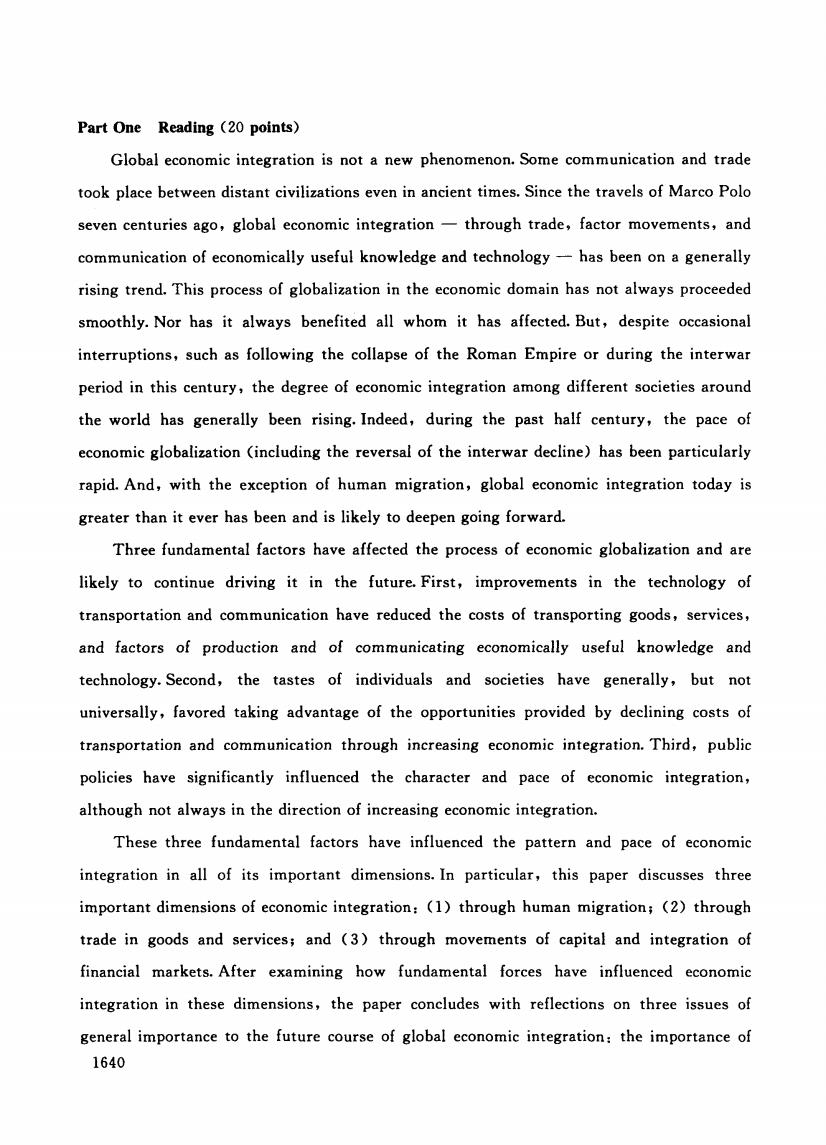正在加载图片...

Part One Reading (20 points) Global economic integration is not a new phenomenon.Some communication and trade took place between distant civilizations even in ancient times.Since the travels of Marco Polo seven centuries ago,global economic integration-through trade,factor movements,and communication of economically useful knowledge and technology-has been on a generally rising trend.This process of globalization in the economic domain has not always proceeded smoothly.Nor has it always benefited all whom it has affected.But,despite occasional interruptions,such as following the collapse of the Roman Empire or during the interwar period in this century,the degree of economic integration among different societies around the world has generally been rising.Indeed,during the past half century,the pace of economic globalization (including the reversal of the interwar decline)has been particularly rapid.And,with the exception of human migration,global economic integration today is greater than it ever has been and is likely to deepen going forward. Three fundamental factors have affected the process of economic globalization and are likely to continue driving it in the future.First,improvements in the technology of transportation and communication have reduced the costs of transporting goods,services, and factors of production and of communicating economically useful knowledge and technology.Second,the tastes of individuals and societies have generally,but not universally,favored taking advantage of the opportunities provided by declining costs of transportation and communication through increasing economic integration.Third,public policies have significantly influenced the character and pace of economic integration, although not always in the direction of increasing economic integration. These three fundamental factors have influenced the pattern and pace of economic integration in all of its important dimensions.In particular,this paper discusses three important dimensions of economic integration:(1)through human migration;(2)through trade in goods and services;and (3)through movements of capital and integration of financial markets.After examining how fundamental forces have influenced economic integration in these dimensions,the paper concludes with reflections on three issues of general importance to the future course of global economic integration:the importance of 1640Part One Reading (20 points) Global economic integration is not a new phenomenon. Some communication and trade took place between distant civilizations even in ancient times. Since the travels of Marco Polo seven centuries ago , global economic integration - through trade , factor movements, and communication of economically useful knowledge and technology - has been on a generally rising trend. This process of globalization in the economic domain has not always proceeded smoothly. Nor has it always benefited all whom it has affected. But , despite occasional interruptions, such as following the collapse of the Roman Empire or during the interwar period in this century , the degree of economic integration among different societies around the world has generally been rising. Indeed , during the past half century, the pace of economic globalization (including the reversal of the interwar decline) has been particularly rapid. And , with the exception of human migration , global economic integration today is greater than it ever has been and is likely to deepen going forward. Three fundamental factors have affected the process of economic globalization and are likely to continue driving it in the future. First, improvements in the technology of transportation and communication have reduced the costs of transporting goods, services, and factors of production and of communicating economically useful knowledge and technology. Second, the tastes of individuals and societies have generally , but not universally , favored taking advantage of the opportunities provided by declining costs of transportation and communication through increasing economic integration. Third , public policies have significantly influenced the character and pace of economic integration , although not always in the direction of increasing economic integration. These three fundamental factors have influenced the pattern and pace of economic integration in all of its important dimensions. In particular, this paper discusses three important dimensions of economic integration: (1) through human migration; (2) through trade in goods and services; and (3) through movements of capital and integration of financial markets. After examining how fundamental forces have influenced economic integration in these dimensions, the paper concludes with reflections on three issues of general importance to the future course of global economic integration: the importance of 1640